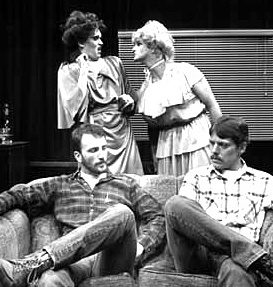|
Welcome to the Archive Version of the online On the Purple Circuit, which ran from 2000-2021. Bill Kaiser founded the Circuit as a newsletter in 1991, and, in 2000, Demian joined as co-editor. Demian programmed the site, expanded the scope of the Circuit, as well as retouched all the images. Demian needed to stop working on the Purple Circuit in order to realize his other projects, such as publishing the book “Operating Manual for Same-Sex Couples: Navigating the rules, rites & rights,” now available on Amazon, and to publishing his “Photo Stories by Demian” books based on his more than 6 decades as a photographer and writer. QueerWise and Michael Kearns have committed to offering a continuation of the Purple Circuit. The new Web address is purplecircuit.org. Bill Kaiser continues as editor and can be reached at purplecir@aol.com Bill and Demian express their appreciation for the hundreds of writers, directors, actors, and publicists who sent their articles and play data. They have toiled mightily to bring our gay, lesbian, trans, and feminist culture into public view, and appreciation. |
| Bill Kaiser, founder (1991), publisher, editor - purplecir@aol.com - 818-953-5096 Demian, associate editor (2000), Web builder, image retouch (since 2003) Contents © 2022, Purple Circuit, 921 N. Naomi St., Burbank, CA 91505 |
|
Forever After by Doric Wilson June 16, 2000, revised June 1, 2007 |
“Forever After” opened in 1980 as part of the First Gay American Arts Festival organized by the Glines. (I don’t recall a second festival.) It shared the bill with every one from Jack Wrangler, Ned Rorem, John Rechy, to Eartha Kitt. The Festival included premieres of plays that were to become central to the gay theater cannon. Jane Chamber’s haunting and heartbreaking “Last Summer at Bluefish Cove” (Jean Smart’s NYC debut); Robert (Don’t play with those words, you don’t know where they’ve been) Patrick’s “T-Shirts,” a sweet three-part invention on (amongst other things) the joys of aging; and Cal Yoaman’s neatly twisted “Richmond Jim” (a play I never fully appreciated until Jerry West’s production in Portland, Oregon). Playwrights also present (at least in the periphery) were the frog-voiced theatrical double threat Harvey Fierstein; butch mutchkin Victor Bumbalo; wicked waif Martin Sherman; and arguably the most original voice in gay theater (and my dear friend) Robert Chesley. In other words, the Festival (thank you, Larry Lane and John Glines) collected the very best New York gay theater had to offer in the 1970s. Knowing that many of the above mentioned playwrights would attend my first night, I had great fun targeting some of them in “Forever After” (after first taking a pot shot at myself). To not appear gay chauvinistic, I included the certifiably heterosexual (fellow Cino alumni) Sam Shepard in my sights. After the performance, Jane Chambers gave me a big kiss in gratitude for excluding her. Having written “Forever After” as a pièce de occasion, I didn’t expect it to have a life beyond the Festival. It became one of my most produced plays (Boston did it countless times) and the muses still show up to “queer” the climax, most recently in Kansas City and Bohemia, Long Island. “Forever After” was also the first play Terry Helbing published in his JH Press Gay Play Script Series. For most of the 70s, Terry Helbing was the mogul of gay theater. Conflict of interest was an alien concept to him, by the time of the Mineshaft production of “Street Theater,” he produced the play (as Meridian Gay Theatre), published it (JH Press), acted in it (Jordan), represented it as my agent, and was furious because the newspaper he wrote for wouldn’t allow him to review it. He did everything in the theater except write plays for it. And he wasn’t as funny as Casey Wayne. |
